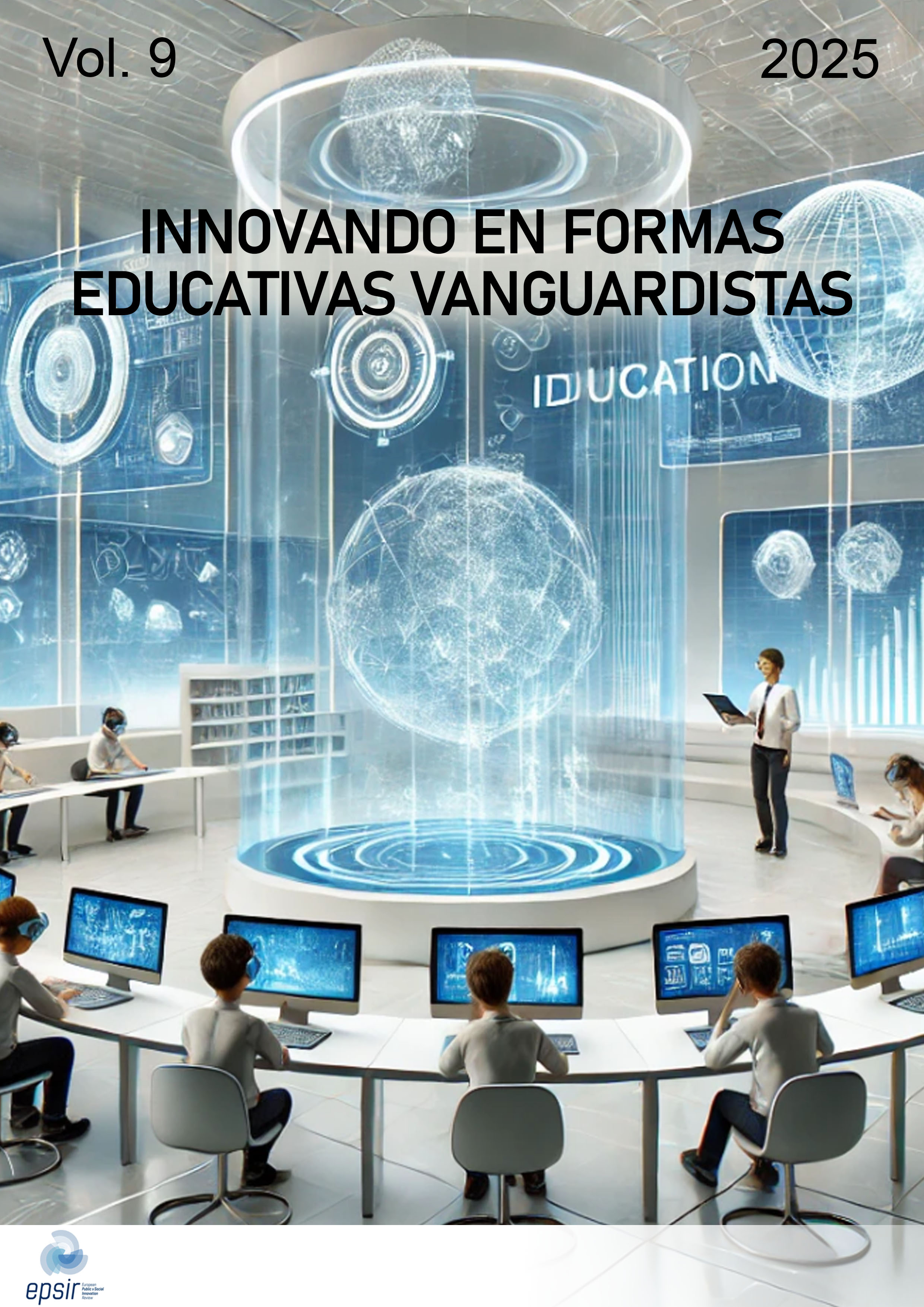Innovating in avant-garde educational forms
DOI:
https://doi.org/10.31637/epsir-2024-1728Keywords:
Active methodologies, Gamification, Flipped classroom, Challenge-based learning, Educational innovationAbstract
This monograph focuses on educational innovation in higher education, exploring active methodologies and the use of disruptive technologies to improve learning and academic outcomes. It highlights Challenge-Based Learning (RBL), technologies such as escape rooms and gamification, and the flipped classroom model, which favor critical thinking, problem solving and student autonomy. The importance of integrating cultural and social approaches, such as the “Dialogue of Knowledge” and service-learning, to promote an inclusive and contextualized education is discussed. In addition, new forms of assessment, such as blended self-assessment and participatory assessment, are examined to develop social-emotional competencies and promote self-reflection. This monograph invites practical studies that explore how these educational innovations can transform higher education, preparing it for the challenges of the future and enhancing the educational experience.
Downloads
References
Agreda Sigindioy, T. M. (2024). Transformando la educación: el papel de la formación intercultural del profesorado para la integración de estudiantes migrantes internacionales. Revista Innovaciones Educativas, 26(40), 223-234. http://dx.doi.org/10.22458/ie.v26i40.4816 DOI: https://doi.org/10.22458/ie.v26i40.4816
Alejandre-Amela, M., Monfort Soler, S., Sagarzazu, N., Urrea Eito, A. D. y Rodríguez Casals, C. (2023). Aprendizaje basado en Retos en Formación Profesional: el reto del salmón. Ápice. Revista de Educación Científica, 7(2), 79-93. https://doi.org/10.17979/arec.2023.7.2.9561 DOI: https://doi.org/10.17979/arec.2023.7.2.9561
Aravena Kenigs, O., Villagra Bravo, C., Troncoso Bustos, C. y Mellado Hernández, M. E. (2023). Autoevaluación del liderazgo pedagógico: Una experiencia de aprendizaje y desarrollo profesional en la escuela. Perspectiva Educacional, 62(1), 113-139. http://dx.doi.org/10.4151/07189729-vol.62-iss.1-art.1396 DOI: https://doi.org/10.4151/07189729-Vol.62-Iss.1-Art.1396
Galvis Doménech, M. J., Cortijo Ruiz, G. y Carmona Rodríguez, C. (2024). La aplicación de la metodología flipped classroom en el ámbito de la Educación Superior. European Public & Social Innovation Review, 9, 1–19. https://doi.org/10.31637/epsir-2024-582 DOI: https://doi.org/10.31637/epsir-2024-582
Ganga-Contreras, F., Viancos, P., Díaz-Barrios, J., Alarcón, N. y Sáez, W. (2021). Producción científica sobre coronavirus y SARS-CoV-2 publicada en revistas indexadas en la base de datos Scopus. Bibliotecas. Anales de Investigación, 17(2), 159-180. http://revistas.bnjm.sld.cu/index.php/BAI/article/view/411/393
López Ruiz, M. J. (2024). Proyectos de Aprendizaje Servicio en la Universidad bajo el enfoque de Enseñanza en cadena y su proyección social. European Public & Social Innovation Review, 9, 1–19. https://doi.org/10.31637/epsir-2024-355 DOI: https://doi.org/10.31637/epsir-2024-355
Pico-Poma, J. P. y Vaca-Cárdenas, L. A. (2023). Flipped classroom en procesos de enseñanza-aprendizaje en carreras de ingeniería: Revisión Sistemática. Episteme Koinonía. Revista Electrónica de Ciencias de la Educación, Humanidades, Artes y Bellas Artes, 6(12), 61-102. https://doi.org/10.35381/e.k.v6i12.2524 DOI: https://doi.org/10.35381/e.k.v6i12.2524
Requena, E. L., Sandemetrio, E. G. y Secanell, I. L. (2024). Diseño de un escape room basado en los ODS: experiencia de gamificación en el aula con alumnado del Máster de Profesorado de Enseñanza Secundaria. Universitas Tarraconensis. Revista de Ciències de l'Educació, 1. https://raco.cat/index.php/UTE/article/view/428381
Vizuete, J. D. R., Mera, C. A. C., Cedeño, E. I. B. y Mera, K. A. S. (2023). Realidad aumentada como estrategia didáctica innovadora en la enseñanza de Tecnologías de la Información y Comunicación: Augmented reality as an innovative teaching strategy in the teaching of Information and Communication Technologies. Revista Científica Multidisciplinar G-nerando, 4(2), 903-922. https://doi.org/10.60100/rcmg.v4i2.178 DOI: https://doi.org/10.60100/rcmg.v4i2.178
Zambrano, V. R. J. y Cornejo-Zambrano, J. K. (2023). La Construcción de las Matemáticas a partir de los Recursos de Gamificación. Revista Tecnológica-Educativa Docentes 2.0, 16(2), 138-142. https://doi.org/10.37843/rted.v16i2.388 DOI: https://doi.org/10.37843/rted.v16i2.388

Downloads
Published
How to Cite
Issue
Section
License
Copyright (c) 2024 Javier Rodríguez Torres, Cinta Gallent Torres, Vicenta Gisbert Caudelli

This work is licensed under a Creative Commons Attribution-NonCommercial-NoDerivatives 4.0 International License.
Authors who publish with this journal agree to the following terms:- Authors retain copyright and grant the journal right of first publication with the work simultaneously licensed under Creative Commons Non Commercial, No Derivatives Attribution 4.0. International (CC BY-NC-ND 4.0.), that allows others to share the work with an acknowledgement of the work's authorship and initial publication in this journal.
- Authors are able to enter into separate, additional contractual arrangements for the non-exclusive distribution of the journal's published version of the work (e.g., post it to an institutional repository or publish it in a book), with an acknowledgement of its initial publication in this journal.
- Authors are permitted and encouraged to post their work online (e.g., in institutional repositories or on their website) prior to and during the submission process, as it can lead to productive exchanges, as well as earlier and greater citation of published work (See The Effect of Open Access).


